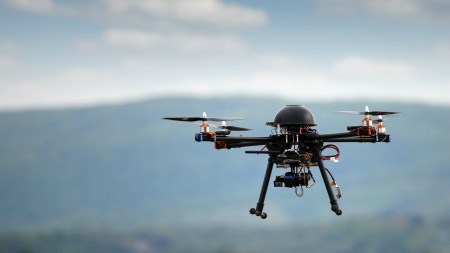Drones are being seen more and more in residential areas, and not just as an extra-mural activity, but as an add-on value for various business activities.
It’s a lazy Sunday afternoon, and dozing by the pool you become semi-alert to the light buzzing of a bee. As it becomes louder, you rise from your horizontal position in preparation to swat it away. Your heartbeat quickens as the noise escalates and just as you prepare to run from the swarm that surely will soon reach you, on the periphery on your eyesight appears a single drone.
It is not by accident that unmanned aerial/aircraft vehicles (UAVs) are called drones, after the male honey bee and relative to the noise bee’s make. Essentially a flying robot, drones are piloted remotely or via software, on a flight that is realising enormous benefits for those in the home property market.
Drones & Security
Debatably one of the most effective uses is for Security. A specified area is defined, either by programming a drone to follow a specified course using GPS or by a grounded human pilot. Mounted with a high-end camera - with some models equipped with thermal technology for night-time - and linked to a traditional CCTV system, the drone will Livestream video images to a control centre, which enables security personnel to be more proactive than reactive.
The benefits are enormous for security teams, among them: response times are lowered; they gain valuable insight into potential and existing threats; alarms can be triggered before even the individual home security system itself is activated; criminal elements can be tracked, and identification of vehicles and criminal individuals is accurate.
Drones & Roof Maintainance
Drones are transforming the home roof maintenance and repair market. One of the biggest hazards of a roof inspection is the unknown vulnerabilities in a physical walkover. Inspectors are exposed to potential injuries from falling off ladders, falling through a collapsing roof, and even (yes there is that bee-thing again) insect bites.
UAVs completely eliminate most of these dangers because they are able to identify risks before repairs or maintenance is undertaken. They are particularly useful where there is a complicated roof design or elevation and hard-to-access areas, and can be undertaken in a fraction of the time taken using conventional methods. Owners can be onsite with the drone operator, to see for themselves the nature of the problem; or be shown images/videos immediately.
There is also the potential to reduce the cost of inspection and labour given the ability to completely identify upfront, most, if not all, repairs required.
Site Planning & Construction
For developers, or those considering purchasing huge pieces of land, drones are becoming somewhat standard in the market. Aerial photographs of a land investment are necessary to understand geology surveys of the land such as elevation, environment, and potential disaster zones.
Traditionally it was costly to understand greenfield sites given the requirement of a piloted plane or helicopter to capture such images. Drones completely replace this system. The data captured can even measure finite dimensions, which when used to direct a site plan, gives owners and architects a better visual of property concept; it may even influence a change in the original design.
Owners also no longer need to visit their property during construction. Progress reports can be undertaken by UAVs and builders can ensure, from an aerial perspective, that everything is where it is supposed to be. In this way, timelines can be better adhered to.
Selling Homes With Drones
The technology behind drones is also changing the way in which we view properties for sale/rent. Potential buyers and renters now have the opportunity to view a property from the comfort of a chair in their homes and offices, and from even the most remote locations across the globe. With the ability to present a full 360 degree tour, the entire footprint of a property is showcased, not just the external but internal structure of a building, inclusive of individual rooms.
Consideration must also be given to being able to have a birds-eye view of the property and its neighbouring environment. Features can be highlighted, and concerns highlighted by a potential customer can be viewed from all angles. A negative is that drones do not, generally, pick up any audio while flying.
Estate agents save enormously in not needing to host show days, but in also presenting clients with any number of different properties without the need to travel from one location to another.
The Rules Of Drones
Like most new technology, there is a scramble to legislate and keep regulation up-to-date with developments. Not least of all the considerations for this, is privacy and safety. The current South African Civil Aviation Authority (SACAA) Regulations do however prescribe specific requirements for operating a drone – be that for personal or commercial use. Infringement of those, even for hobby drone pilots, can be as severe as a 10-year prison sentence and/or a fine of up to R50 000. At essence, the SACAA Remotely Piloted Aircraft Systems (RPAS) Part 101 Regulations, are:
- No flying near manned aircrafts or within up to 10km of an aerodrome, nor in controlled, restricted and prohibited airspaces;
- Not to fly any remotely piloted aircraft weighing more than 7 kg;
- To protect private property and individual privacy, drones may not be flown within 50 metres of such, and explicit permission must be obtained should you wish to infringe this right;
- Drone pilots must have a visual line of sight with their drones at all times while it is in flight;
- Drones may only be flown during daylight; and
- Drones used for commercial interest, outcome or gain, require registration and licencing by the SACAA. Hobbyists do not require registration or licencing.
Three quick facts
- It is estimated that 1 in 10 drones are destroyed on the first flight, most due to simple pilot error.
- Also estimated is there are up to 50 000 drones in the country.
- Insurance companies are disinclined to insure drones due to cost of repair, fragility of equipment, and frequency of accidents.



